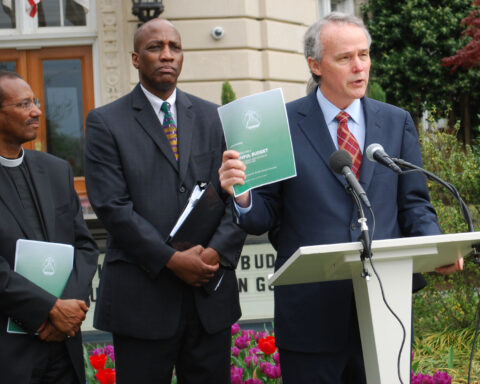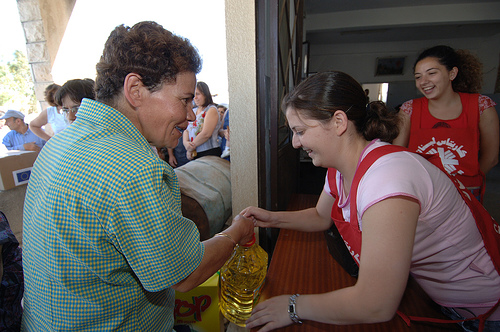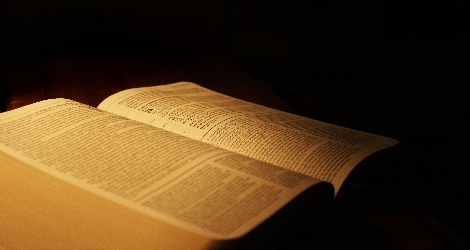[wpcol_1half id=”” class=”” style=””]
Conclusion: This is God’s house
The heritage of scripture tells us that the sovereigns and structures of this world are ultimately no match for God and God’s purposes. Though the power of Kings and Emperors—corporations and politicians—seem irresistible, God freed Israel from slavery in Egypt and raised Jesus from the dead after his execution on a Roman cross. In a world where wealth so often flows up the hierarchies of society until it accumulates in the hands of the few, God made clear the reality of a deeper and more profound order in which blessings flow from the hands of the true sovereign out to all, including, especially, those at the margins of prosperity. There is enough for all, and each is called to use what she has been given not only for her own survival and flourishing but also for the sake of her neighbors, near and far. Through God’s mighty acts in history, all of creation is being called back to itself—to the true order of ultimate dependence on God, relative independence from and equality with one another, and unavoidable interdependence and mutual reliance on each other.
This structure and order is not artificially imposed upon us and the world. It is the deeper structure of creation which continues to hold sway despite the corruption and curse of sin. In Genesis 1, each day God created something different and proclaimed it good in and of itself and blessed it for its own sake. But on the final day of creation, God surveyed all that God had made and proclaimed it very good. All together the creation was more than the sum of the parts. Each part was good and valuable all by itself; it was suitable for blessings. But each part was also bound to the others; its blessing depended on the blessings of others.
[/wpcol_1half] [wpcol_1half_end id=”” class=”” style=””]
Human beings, the story says, were given dominion over this creation. But their dominion was to be carried out in the image of God. They were not to lord over one another or lord over the rest of creation. Rather they were to be the ones who blessed one another and the creation. They were to be the servants of God’s purposes in the world.
This deep structure of creation was identified and recovered in the covenant at Sinai after God liberated the Israelites from slavery. It was incarnate in the words, deeds, and person of Jesus Christ. And it continues to live in the memory and practice of the church as it becomes the body of Christ by the power of the Holy Spirit. In any and every age, the scriptures provide a memory of God’s mighty acts and a witness to the often hidden power and purpose behind existence. In a world where people feel that they have earned what they have, the Bible reminds us of our absolute dependence upon God. In a time when people feel so powerless that they are induced to passivity, the scriptures remind us of our relative independence and equal dignity. In a world where people protect their own interests and feel no sense of responsibility for their neighbors, the scriptures remind us that we are bound together in webs of interdependence.
[/wpcol_1half_end]
Timothy A Beach-Verhey is co-pastor, with his wife, Kathy, of Faison Presbyterian Church, in Faison, NC. He also teaches at Mount Olive College and is the author of Robust Liberalism: H. Richard Niebuhr and the Ethics of American Political Life from Baylor University Press. Photo by Leroy Skalstad.
Notes
[1] G. F. W. Hegel, A Philosophy of Rights, trans. T. M. Knox (London: Oxford University Press, 1967).
[2] See Gerhard Von Rad, Old Testament Theology, vol. I., trans. D.M.G. Stalker (San Francisco, CA: Harper and Row Publishers, 1962), 121-128. All scriptural quotations are from the New Revised Standard Version, unless otherwise noted.
[3] An omer refers to a specific weight of wheat or grain (William Smith, “Weights and Measures,” Smith’s Bible Dictionary).
[4] The idea that the story of the manna provides a counter-narrative to the religio-economic system of Egyptian imperialism is taken from Ellen Davis. See Scripture, Culture, and Agriculture: An Agrarian Reading of the Bible (Cambridge: Cambridge University Press, 2009), especially Chapter 4, “Leaving Egypt Behind: Embracing the Wilderness Economy,” 66-79.
[5] This covenant-focused survey can only note the more detailed treatment by Norman Gottwald and others of the nature of the liberated “tribes of Yahweh” and the layers of extractive mechanisms present in the several empires referenced in this text.
[6] Ross Kinsler and Gloria Kinsler, The Biblical Jubilee and the Struggle for Life (Maryknoll, NY: Orbis Books, 1999), 16.





Unbound Social